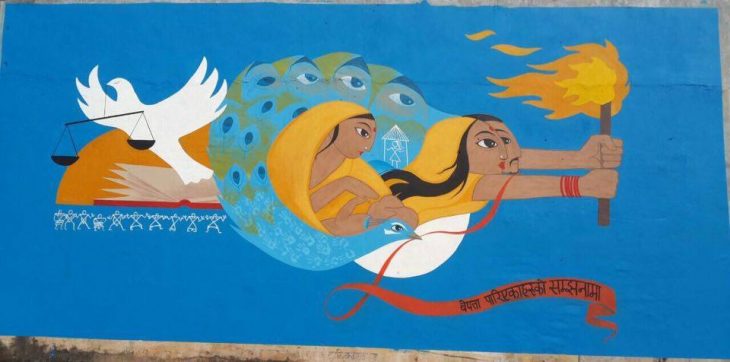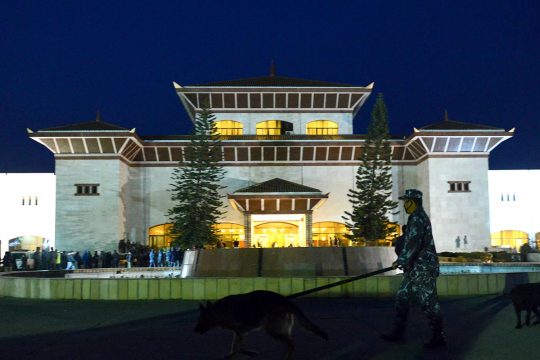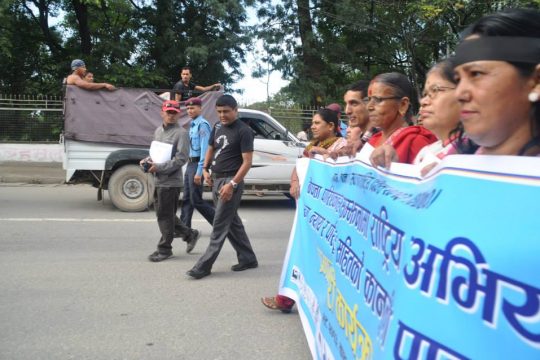“When I see the role of NGOs, human rights groups and politics, I think transitional justice is rather an experimental laboratory of various actors, where suffering families’ continue to wait for justice and gain nothing from the false process of political reconciliation and instrumentalisation of interest groups who dominate the victim’s needs and realities in the ground.” says Bhagiram Chaudhary, the district-based victim’s advocate who has been speaking for fellow victims in the Nepal’s countryside for many years.
10 years after the signing of the Comprehensive Peace Agreement (CPA – signed in 2006), the situation of conflict victims continues to worsen and the hope for justice has become complex. The security institutions and the political leadership that drives the transitional process do not intend to disclose the truth regarding conflict era crimes and disappearances. Rather, they persist in evading continued calls for truth and justice, working to undermine the transitional process to further their political goals. For many families of the disappeared, the long wait has made them hopeless and disappointed in the current transitional mechanisms. Motimaya, a mother whose son disappeared during the conflict said “How long should we wait to know about the fates of my son’s whereabouts”. Victims have seen the alleged perpetrators’ gain promotion to senior security positions, and make deals that sustain unhealthy government coalitions and protect criminals. Victims are unable to speak openly against alleged perpetrators, who are powerful and linked to government mechanisms for fear of retribution. As a result a majority of victims have little hope that the transitional justice (transitional justice) mechanism (Truth and Reconciliation Commission (TRC) and CIEDP (Commission of Investigation on Enforced Disappeared Persons ) will thoroughly investigate to reveal the truth, and provide justice to them. Both the commissions never asked what does justice mean them for the suffering families and victims, and not provided spaces to tell their stories of the past. In the registered complaints, both commissions failed to prioritize victims’ key demands and testimony. They succeeded in recording over 60,000 conflict related violations, but the question of systematic investigation, protection of evidences, protection of victims and witnesses and archiving that evidence after the commission’s phase remains uncertain. Sumina and Roshan (name changed) recently visited to the TRC and submitted applications to withdraw their complaints because they felt pressure from the alleged perpetrators and little hope with the commission process which may not address their needs and may not mitigate the security threat that they receive. These are symbolic cases, however the sentiments are similar to those of thousands of victims and families in the countryside who feel that the current transitional justice system cannot address their everyday needs, poverty and social exclusion as they have been fully excluded by the central commission process which has not only been top-down but also led by political elites and by non-government agencies that fail to understand local realities and instead prescribe their own notion of global transitional modality. As a result, Nepal’s transitional justice process has been disturbed by a lack of accountability due to political interference a culture of impunity and a non-transformative process rooted in liberal ideas of global transitional justice.
Passive transitional justice commission
The transitional justice commissions – TRC and CIEDP, after their original two years mandate (ended on Feb 2017), have become passive and lost due to internal problems, fighting on egos, creating political gaps and delinking with victims’ demands. They have no clear roadmap for the additional year of work. Both the commissions act as administrative unit wrangling on daily works rather than focusing on the broader policy work. Ultimately this amounts to the abuse of public resources and the reproduction of victims and creation of a space for alleged perpetrators. From victim’s perspectives, Nepal’s transition is stillborn, without transformation. This unwanted situation has increased the level of anger and frustrations within communities, widening a gap in between state mechanism and the victims, this has developed an anti-state mindset and realizing a social intervention to find alternatives such as an informal route to solve their daily needs, addressing poverty and advancing human dignity through truth seeking, creating spaces for local voices and conflict stories, localizing justice process through memory initiatives, local cooperatives, micro-finances, victim-non-victim cooperation, income generation, support schemes to help each other. Many local practices are taking shapes as alternatives approach to sustainability; resisting global transitional justice to change the paradigm of disempowering victims, instead empowering them to prepare for their future.





